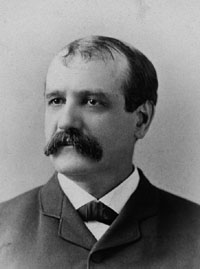Francis Amasa Walker
| Francis Amasa Walker | |
|---|---|

Francis Amasa Walker
|
|
| Born |
July 2, 1840 Boston, Massachusetts |
| Died | January 5, 1897 (aged 56) Boston, Massachusetts |
| Resting place | Walnut Grove cemetery, North Brookfield, Massachusetts |
| Education | Bachelor of Laws |
| Alma mater | Amherst College |
| Occupation | Economist Statistician Civil servant Military officer University president |
| Known for | President of MIT (1881–1897) Superintendent of the 1870 and 1880 censuses Commissioner of Indian Affairs (1871–1872) |
| Predecessor | William Barton Rogers (MIT) |
| Successor | James Crafts (MIT) |
| Board member of |
American Statistical Association American Economic Association |
| Spouse(s) | Exene Evelyn Stoughton |
| Children | Stoughton (1866–), Lucy (1867–), Francis (1870–), Ambrose (1870–), Eveline (1875–), Everett (1876–), Stuart (1878–) |
| Parent(s) | Hanna Ambrose (1803–1875) and Amasa Walker (1799–1879) |
| Signature | |
Francis Amasa Walker (July 2, 1840 – January 5, 1897) was an American economist, statistician, journalist, educator, academic administrator, and military officer in the Union Army.
Walker was born into a prominent Boston family, the son of the economist and politician Amasa Walker, and he graduated from Amherst College at the age of 20. He received a commission to join the 15th Massachusetts Infantry and quickly rose through the ranks as an assistant adjutant general. Walker fought in the Peninsula Campaign and was wounded at the Battle of Chancellorsville but subsequently participated in the Bristoe, Overland, and Richmond-Petersburg Campaigns before being captured by Confederate forces and held at the infamous Libby Prison. In July 1866, he was nominated by President Andrew Johnson and confirmed by the United States Senate for the award of the honorary grade of brevet brigadier general United States Volunteers, to rank from March 13, 1865, when he was age 24.
Following the war, Walker served on the editorial staff of the Springfield Republican before using his family and military connections to gain appointment as the Chief of the Bureau of Statistics from 1869 to 1870 and Superintendent of the 1870 census where he published an award-winning Statistical Atlas visualizing the data for the first time. He joined Yale University's Sheffield Scientific School as a professor of political economy in 1872 and rose to international prominence serving as a chief member of the 1876 Philadelphia Exposition, American representative to the 1878 International Monetary Conference, President of the American Statistical Association in 1882, and inaugural President of the American Economic Association in 1886, and vice president of the National Academy of Sciences in 1890. Walker also led the 1880 census which resulted in a twenty-two volume census, cementing Walker's reputation as the nation's preeminent statistician.
...
Wikipedia
